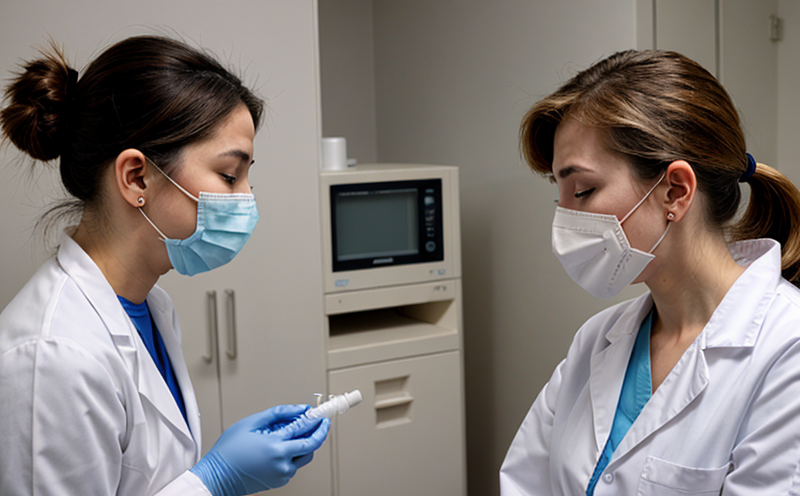Allergen Risk Assessment Testing in Food Supply Chains
Ensuring food safety is a paramount concern across the global food supply chain. Allergens such as peanuts, tree nuts, milk, eggs, fish, shellfish, soybeans, and wheat are among the most common dietary allergens that can cause severe allergic reactions or anaphylaxis in susceptible individuals. The critical role of allergy & immunology testing is to identify potential risks at every stage of production, processing, packaging, and distribution.
Allergen risk assessment involves a series of steps aimed at mitigating the likelihood of allergens entering the food supply chain. This process begins with understanding the sources of allergens in raw materials, identifying cross-contamination hazards during manufacturing processes, and ensuring proper labeling to inform consumers about potential risks. The goal is to prevent accidental exposure that could lead to severe health consequences.
The testing methods employed for this purpose are based on international standards such as ISO 15216-1:2017 and ISO 15216-2:2018, which outline the procedures for detection of specific allergens in food. Laboratories like ours use advanced instrumentation including liquid chromatography-tandem mass spectrometry (LC-MS/MS) to achieve high sensitivity and specificity.
The process typically involves:
- Sample collection from raw materials
- Preparation of samples for analysis
- Analytical testing using LC-MS/MS
- Data interpretation and reporting
Our team of experts works closely with clients to ensure that every aspect of the supply chain is covered, from ingredient sourcing to final product release. We provide comprehensive reports detailing allergen presence and potential risks, which are invaluable for regulatory compliance and consumer trust.
The significance of this testing cannot be overstated in today's hyper-aware food safety landscape. Consumers expect transparency regarding potential allergens, and regulators demand stringent measures to protect public health. By implementing robust allergen risk assessment programs, companies can avoid costly recalls, lawsuits, and damage to their brand reputation.
Why It Matters
The importance of allergen risk assessment in the food supply chain cannot be overstated due to its direct impact on public health. Anaphylaxis, a severe allergic reaction, can result in death if not treated promptly and effectively. Even minor exposure to allergens can trigger symptoms that range from mild irritation to life-threatening conditions.
Regulatory bodies such as the Food and Drug Administration (FDA) and European Commission have stringent guidelines regarding allergen labeling and control measures. Non-compliance can lead to severe penalties, including fines and product recalls. These actions not only harm a company's reputation but also pose significant financial risks.
In addition to legal compliance, allergen risk assessment plays a crucial role in maintaining consumer trust. In an era where transparency is key, consumers expect companies to take proactive measures to ensure the safety of their products. By demonstrating a commitment to food safety and allergen control, businesses can build long-term relationships with their customers.
The impact extends beyond legal and reputational considerations; it also involves operational efficiency. Efficient allergen management reduces the risk of cross-contamination between different product lines, thereby minimizing waste and improving production processes. This, in turn, contributes to higher quality standards and cost savings for companies.
Customer Impact and Satisfaction
The implementation of robust allergen testing protocols has a direct impact on customer satisfaction within the food industry. By ensuring that products are free from harmful allergens, companies can significantly enhance consumer trust and confidence in their brands. This is particularly important for those with severe allergies who rely on accurate labeling to avoid potential life-threatening situations.
Our services not only meet but often exceed regulatory requirements, providing customers with peace of mind. The detailed reports we generate help them make informed decisions about ingredient sourcing and processing methods. This level of service translates into higher customer satisfaction scores and improved brand loyalty.
- Enhanced Trust: Customers trust brands that prioritize food safety and allergen control.
- Increased Sales: By reducing the risk of recalls, companies can increase sales and maintain market share.
- Better Brand Reputation: A reputation for reliability in food safety is a significant asset in today's competitive marketplace.
- Operational Efficiency: Efficient allergen management leads to reduced waste and improved production processes.
In summary, the benefits of our allergen risk assessment testing extend far beyond compliance. They contribute to a safer food supply chain, increased customer trust, enhanced brand reputation, and operational efficiency—all factors that are crucial for long-term success in the food industry.
Competitive Advantage and Market Impact
In today’s competitive global market, maintaining high standards of food safety is not just a legal requirement but also a strategic advantage. Companies that excel in allergen risk assessment are better positioned to meet consumer expectations and regulatory demands. By implementing advanced testing methods and maintaining rigorous quality control measures, businesses can differentiate themselves from competitors.
The ability to provide detailed reports on allergen presence and potential risks sets us apart as a trusted partner for food manufacturers and retailers. Our expertise in this area allows us to offer customized solutions tailored to each client’s unique needs. This personalized approach ensures that our clients have the tools they need to stay ahead of regulatory changes and consumer demands.
Our services also contribute to market stability by helping companies avoid costly mistakes such as product recalls or legal disputes. By proactively identifying allergen risks, we help businesses maintain a consistent supply of safe products, which is essential for long-term success in the food industry. This proactive approach not only protects consumers but also strengthens our clients’ positions in the marketplace.





